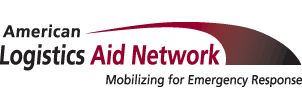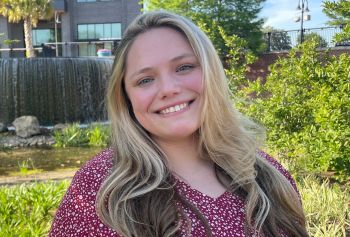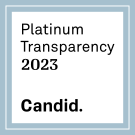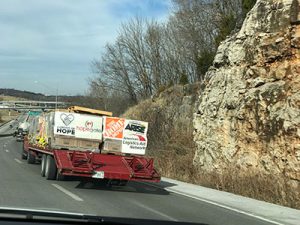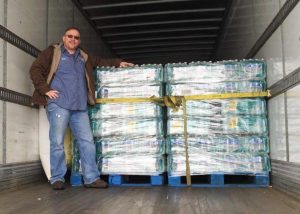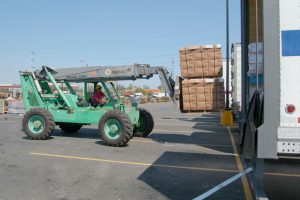Technically speaking, you can’t spell Alexia Nobles’ last name without the word “no.”
Which is ironic because she’s become famous around ALAN for not taking that word for an answer.
Over the last 15 months, she’s been responsible for ensuring that our non-profit partners get the donated logistics space, services, equipment and supplies they need after disasters hit. And based on the uptick in completed cases (aka “yesses”) we’ve seen since her arrival, she’s clearly more than equal to the challenge.
So what’s the secret to her success? We recently sat down for this quick chat with her to find out.
So Lexi, first things first. Tell us about how you came to work in disaster relief.
I’ve always had an interest in disasters – what nature can conjure up, how communities rebuild and things like that. And I’ve always wanted to pursue a career that enabled me to help people. But it wasn’t until I took a college class called “Disasters: Shock To Recovery” that I realized there was a way to combine those two things in a meaningful way.
And that eventually led you to ALAN?
Yes, thanks to an acquaintance with NITL’s Nancy Oliddy, who knew of my master’s degree focus, I was introduced to Kathy Fulton and ALAN’s work. I started as an ALAN intern in February 2023 and then became ALAN’s full-time Operations Coordinator after my graduation in May.
As memory serves, your first couple of months on the job were relatively calm and uneventful, at least by ALAN standards.
I spent the early part of that summer helping with relief efforts for a few weather events. But it wasn’t until August that I got my first experience with what some people would call a “major” ALAN disaster – the Maui wildfires.
Wow! A lot of people SAY their first year on the job was a trial by fire. But yours really was.
And like many of the disasters we work on, it didn’t provide us with a lot of advance warning.
We were hosting our first Blue Skies educational call for non-profits. And someone mentioned the wildfires that had recently started burning in Hawai’i. Within hours, it was clear that the danger had escalated and that a massive amount of help was going to be needed.
Shortly thereafter, we were hosting our first Gray Skies call about the fire, volunteering to run the logistics side of the Hawai’i VOAD’s joint donations and volunteer management task force. . .
And working on filling a lot of urgent requests for help.
Absolutely. The logistics were exceptionally difficult because Maui is an island, and the damage to its infrastructure was massive. Barges were backed up and couldn’t get offloaded, so people initially had to rely on a lot of air freight. Key communications systems were down and needed to be restored quickly for more efficient rescue and relief efforts. And of course, there was an avalanche of need.
You mentioned that avalanche in a case study that we posted on the ALAN website last year.
And I hope people will take the time to read it, because it’s a great example of how the ALAN network really stepped up to make a positive difference. It’s also a great example how a “whole community approach” to disaster relief can significantly improve response and recovery.
Speaking of which, walk us through a typical case.
An ALAN case starts when a non-profit contacts us with a request for donated logistics assistance. My first step is to validate the information and make sure we have all the necessary details – including a definitive origin and destination, details about how many pallets or how much square footage will be involved, information about the type of freight and more.
Once I have the information validated, I then begin trying to match that request with the right in-kind donor.
Do you reach out to every in-kind donor for every case?
We’d wear out our welcome pretty quickly if we did that! Plus it doesn’t really make sense, because there are some kinds of cases – like requests for refrigerated space or full truckload shipments – that only certain kinds of donors can help with.
Because of that, I always try to be as specific, granular and strategic as possible when determining which company or professional association I’m going to approach for help.
What are some criteria you use to determine which potential in-kind donors to reach out to?
Part of it has to do with geography – e.g. where the disaster occurred, where the goods are coming from and going to, and which companies have operations or supplies in those areas. After all, there’s usually no need to reach out to a trucking association in the Pacific Northwest if all the goods and needs that are associated with a particular request are located in the Southeast – or vice versa.
It also depends on who’s already offered to help us or who’s been willing to help in the past, because once a company helps us with a case and sees what a difference it makes, it’s usually willing to help us again.
Timing also plays a role. For example, if we’ve just asked a company to donate a big move, we want to be careful not to overburden them with another large request too soon.
Good thing you have a robust list of potential in-kind donors!
True. It really does take a village – or as we like to say, a network. But we could always use more!
Has there ever been a time when you weren’t quite sure who to ask for help?
That definitely happens, which is why we’re especially grateful to our many association partners.
They’re great about reaching out to their membership when we have certain kinds of needs that pertain to their industry – and it’s made a hugely positive difference in terms of allowing us to get our cases filled.
So has having a dedicated staff member like you.
That’s what I’ve heard. Anytime you can have someone on your team who’s able to spend most of their time focusing on the kinds of things I do, it dramatically increases your ability to help. And thanks to our financial donors, ALAN has finally been able to do that.
You’ve now been with ALAN – and in your first “real-world” job – for about a year and a half. What are some of the most interesting things you’ve learned?
I know a lot more about logistics in general, and that in turn has helped me understand a lot more about what our non-profit partners are looking for. I also feel like I’ve gained a much better handle on how each disaster, even ones like hurricanes that occur year after year, is truly unique.
Most important, I’ve learned that even though there are times when things can get incredibly stressful (especially because we’re helping people during stressful times), doing this kind of work is still one of the most rewarding things I can imagine doing. I’ve had a really good life, and I know that others always haven’t, so I’m so thankful to do what I can to help people.
Is there any one thing you wish people knew about you and ALAN?
That we’re easy to communicate and work with – and that helping us will be hugely fulfilling.
One final question. Since you’ve proven to be so great about getting so many companies to say yes to helping us out, any chance you’d be willing to let us change your name to Lexi Yes-bles?
How about no?
